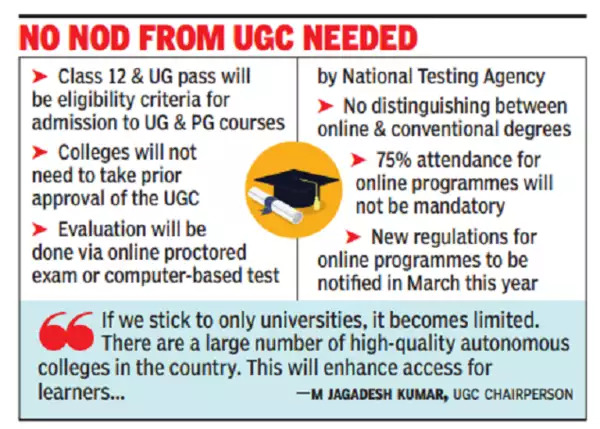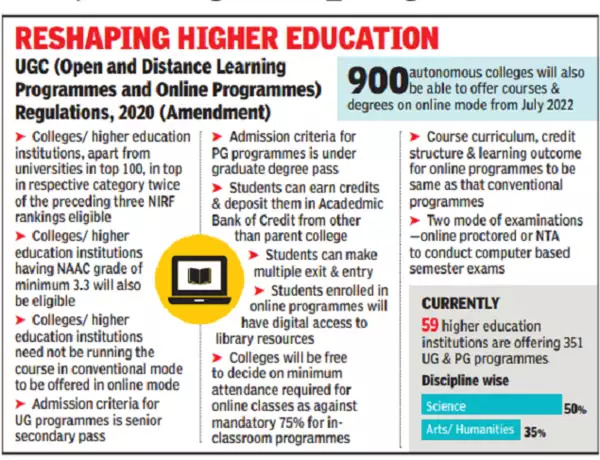
Come 2022-23 academic session, students who cannot get into their target college due to high cutoffs need not be disappointed and grudgingly go for their second choice. That’s because in addition to universities, nearly 900 autonomous colleges across the country will be able to offer courses remotely from July onwards as the government opens up the online education sector in a major reform to achieve 50% gross enrolment ratio by 2035 in alignment with the National Education Policy (NEP) 2020.
Currently, only universities are allowed to offer online degrees. However, the new move will allow autonomous colleges securing ranks in the top 100 list in respective subject category twice in the preceding three rankings of National Institutional Ranking Framework (NIRF) or having National Assessment and Accreditation Council (NAAC) grade of minimum 3.26 to award online degrees without prior approval of the University Grants Commission (UGC), but in compliance with regulations.

Also, unlike in conventional programmes where aspirants are required to have a certain score at the Class 12 level, eligibility for admission to these online undergraduate degree programmes will be simply “senior secondary pass”. Similarly, for admission to online postgraduate degree programmes, the eligibility will be “pass” in the relevant undergraduate course.
The draft for the amendment in the existing UGC (Open and Distance Learning Programmes and Online Programmes) Regulations, 2020 is being finalised and will be available for feedback from stakeholders this week.

All online degrees will have the flexibility of conventional programmes in accordance with NEP 2020 — such as the four-year undergraduate programme with multiple entry and exit facilities. UGC chairperson M Jagadesh Kumar said the online, ODL and conventional degrees will be of equal value.
All this has been done with the underlying goal of pushing up India’s gross enrolment ratio to 50% in the next 13 years in line with the NEP target. It recorded an uptick from 26.3% in 2018-19 to 27.1% in 2019-20 for the 18-23 age group.
“Like NEP, which is built on the five pillars of access, equity, quality, affordability and accountability, the online education ecosystem will be developed on the same principles,” said Kumar.
The new reforms will be notified as amendments in the current regulations issued during the pandemic on September 4, 2020, he said.
Stating that barring professional and technical programmes that need laboratories and those programmes prohibited by any regulatory authority, the UGC chief said online degrees can be offered for all other programmes.
Text Resource – https://timesofindia.indiatimes.com/india/ugc-to-let-900-autonomous-colleges-offer-online-degrees/articleshow/89710850.cms
